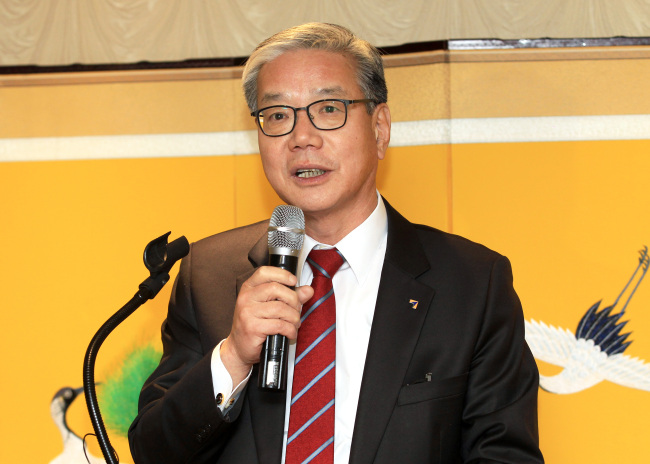The chief of South Korea’s financial investment association, which represents more than 300 brokerages and asset management firms, said he will strive this year to persuade the government to level the playing field for brokerages.
Hwang Young-key, chairman of the Korea Financial Investment Association, said the current law barring securities firms from offering corporate payment and settlement service was unfair, while banks, mutual savings banks and credit unions are allowed to do so.
 |
Hwang Young-key, chairman of the Korea Financial Investment Association, speaks at a press conference in Seoul, Monday. (KOFIA) |
In April 2009, the Korea Financial Telecommunications & Clearings Institute allowed 25 brokerages to enter its payment and settlement system for a combined participation fee of 400 billion won ($352 million), which was later reduced to 337.5 billion won on criticism the fee was too high, but limited on the condition that their payment and settlement services be confined to retail customers.
For example, a company cannot use its brokerage account, but only its bank account, to receive payment after selling products to a client.
“The association has been expressing this unfairness to the financial authorities over and over again last year,” Hwang said at a press conference in Yeouido, Seoul.
“It is nonsense that domination by a certain industry (banks) blocks others (brokerages) from entering,” he said, adding that the brokerages are reviewing various options, such as asking for a refund of the participation fee or filing suit with the Free Trade Commission.
Hwang also noted brokerages cannot offer foreign exchange service unless they have an investment purpose, pointing to it as another unfair regulation.
“Behind this unfairness is the banking industry. While even fintech (financial technology) firms and credit card firms can provide foreign exchange service, it is nonsense that brokerages can’t do the same when we’re discussing nurturing a Korean Goldman Sachs.”
Hwang explicitly expressed his opposition to the banking industry’s recent move to enter the asset management industry.
He compared the banking and asset management market to farming and hunting, respectively.
“It is ineffective for farmers to do hunting and hunters to do farming,” said Hwang, who previously served as chairman of KB Financial Group in 2008-2009 and chairman of Woori Financial Group in 2004-2007.
Looking back on the Korean capital market in recent years, Hwang said Korean investors became mature and more realistic in expecting profits from stock and fund investment, citing a recent survey by the KOFIA on 2,399 individual investors.
While Koreans in 2009 anticipated 27 percent and 23 percent yields in their stock and fund investments, respectively, the figures came down to 9 percent and 7 percent in 2016, he said.
Although the association made some achievements last year, including its push to launch tax-exempt individual savings accounts at brokerages, banks and insurers in March, its volume during the nine months reaching 3.4 trillion won fell far short of the association’s target of 10 trillion won.
Hwang pledged to make more concerted efforts to develop more attractive ISA products to reach the original goal as soon as possible.
By Kim Yoon-mi (
yoonmi@heraldcorp.com)








![[Today’s K-pop] Blackpink’s Jennie, Lisa invited to Coachella as solo acts](http://res.heraldm.com/phpwas/restmb_idxmake.php?idx=644&simg=/content/image/2024/11/21/20241121050099_0.jpg)